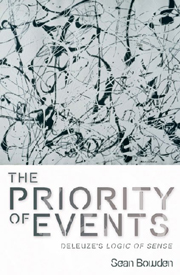Book contents
- Frontmatter
- Contents
- Acknowledgments
- Abbreviations
- Introduction: The Ontological Priority of Events in The Logic of Sense
- 1 The Stoics – Events and Sense
- 2 Leibniz – The Static Ontological and Logical Geneses
- 3 Lautman and Simondon – Problematic Ideas and Singularities
- 4 Structuralism – Structure and the Sense-Event
- 5 Psychoanalysis – Dynamic Genesis
- Conclusion
- Bibliography
- Index
3 - Lautman and Simondon – Problematic Ideas and Singularities
Published online by Cambridge University Press: 12 September 2012
- Frontmatter
- Contents
- Acknowledgments
- Abbreviations
- Introduction: The Ontological Priority of Events in The Logic of Sense
- 1 The Stoics – Events and Sense
- 2 Leibniz – The Static Ontological and Logical Geneses
- 3 Lautman and Simondon – Problematic Ideas and Singularities
- 4 Structuralism – Structure and the Sense-Event
- 5 Psychoanalysis – Dynamic Genesis
- Conclusion
- Bibliography
- Index
Summary
Let us review the ground covered thus far. First of all, we examined how, after analyzing verbs of becoming such as ‘to grow’, Deleuze contends that events must be understood as ideal changes which are ontologically prior to individuated states of affairs. While they are not themselves objectively ‘present’ in the same way as fixed things and states of affairs, Deleuze maintains that events are nevertheless the prior condition for the constitution of new, present states of affairs, as well as for the simultaneous constitution of those presents which are determined as past with respect to these new presents. In other words, events picked out by verbs of becoming both express problematic relations between present states of affairs (‘problematic’ because these relations ‘elude the present’), and determine these states in their temporal relations (past present, present present).
It was also seen that events have a necessary relation to language. Indeed, not being present in the manner of fixed things and states of affairs, Deleuze claims that events do not exist outside of the propositions which express them. What is more, it appears that when it comes to our knowledge of worldly things and their relations, what is crucial is how the events which determine their states are themselves determined, ordered and related using language. The major question, then, for Deleuze's philosophy of the event, is thus: given the ontological priority of events and their relation to language, what are the conditions of the event if everything, including the very language in which events are determined, must ultimately be reducible to events?
- Type
- Chapter
- Information
- The Priority of EventsDeleuze's Logic of Sense, pp. 95 - 151Publisher: Edinburgh University PressPrint publication year: 2011



